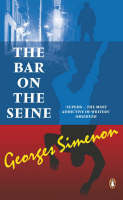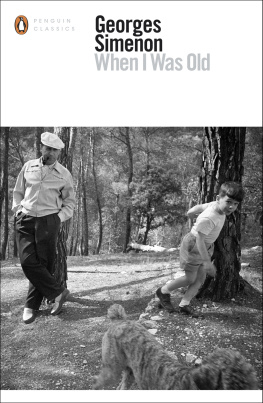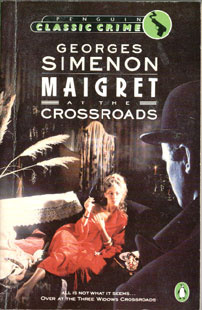Maigret at the Gai-Moulin
La danseuse du Gai-Moulin
the 10th episode in the Maigret Saga
1931
Georges Simenon
translated by Geoffrey Sainsbury
MKM XHTML edition 1.0
contents
Library of Congress Cataloging in Publication Data:
Simenon, Georges, 1903-1989
[Danseuse du Gai-Moulin. English]
Maigret at the Gai-Moulin / Georges Simenon ; translated by Geoffrey Sainsbury. p. cm.
Translation of: La danseuse du Gai-Moulin.
ISBN 1-56054-415-5 (alk. paper : lg. print)
1. Large type books. I. Title. [PQ2637.153D313 1992] 92-9650
843'.912dc20 CIP
Copyright 1991 by The Estate of Georges Simenon. All rights reserved.
At the Gai-Moulin copyright 1940
by Harcourt Brace Jovanovich, Inc.
Copyright renewed 1968
by Harcourt Brace Jovanovich, Inc.
This is a translation of La Danseuse du Gai-Moulin , 1931.
Thorndike Press Large Print edition published in 1992 by arrangement with Harcourt Brace Jovanovich, Inc.
Cover design by James B. Murray.
The tree indicium is a trademark of Thorndike Press.
This book is printed on acid-free, high opacity paper.
1 - The Foreigner
Who is he?
I dont know, said Adle, after blowing out a cloud of cigarette smoke. I never saw him here before.
Lazily she uncrossed her legs, patted her hair to make sure it was in place, and examined her makeup in one of the mirrors with which the room was lined.
She was sitting on one of the crimson plush seats, with a young man on either side of her. On the table in front of them were three glasses of port.
You dont mind, do you?
She gave a friendly, confiding smile to her companions as she stood up. With a slight roll of her hips, she walked over to the newcomer.
The proprietor gave a nod to the orchestra, and its four members sang a verse of the tune they were playing. There was only one couple on the floor, who danced because they were paid to.
It was like that every night. The place seemed deserted. The room was too large for the few people who came, and the mirrors all around made it seem larger still, with their endless reflections of crimson plush seats and gray-white marble tables.
The two young men really boys shifted closer to one another, filling the gap Adle had left.
Shes charming. Jean Chabot, the younger, sighed. With a poise that was assumed, he looked around the room with half-closed eyes.
Hot stuff. said his friend, Ren Delfosse, whose hands were folded over the gold knob of his walking stick.
Chabot was between sixteen and seventeen; Delfosse was eighteen at the most. The latter was a weedy, unhealthy-looking boy with poor features. Young as they were, they would both have been indignant at any suggestion that they were unversed in the ways of the world particularly the bad ways.
Here! Victor! Chabot adopted a familiar tone in speaking to the passing waiter. Do you know who he is?
No. But hes ordered champagne.
And with a wink Victor went on:
Adle will look after him.
He moved off with his tray. The orchestra stopped, then struck up again with a tango. The proprietor himself was uncorking the newcomers champagne, having wound a napkin around the neck of the bottle.
Do you think theyll be shutting late? whispered Chabot.
Between two and half past As usual.
Shall we have another drink?
They were nervous, particularly the younger one, who stared from face to face with uneasy eyes.
How much do you think therell be in it?
Delfosse shrugged, and snapped impatiently:
Shut up!
Adle and her customer were sitting almost opposite them. He was a man about forty, with black hair and a dull, sallow complexion. A Romanian, a Turk, or something of that kind. He wore a pink silk shirt, and a diamond glittered in his tie.
He took little notice of Adle as she talked and laughed and leaned on his shoulder. When she asked him for a cigarette, he produced a gold cigarette case and looked straight in front of him as he handed it to her.
Delfosse and Chabot were silent. They did their best to look at the foreigner with disdain, but actually they admired him intensely. No detail escaped them. They studied his tie and the cut of his suit, and followed every movement as he lifted his glass of champagne.
Chabots suit was ready-made, and his shoes had been resoled more than once. His friends clothes, though of better material, fit badly. Or perhaps it was the fault of his figure. His shoulders were too narrow.
Here comes another customer.
The plush curtain that hung across the entrance had been pulled aside. A man appeared and stood looking around the room. He was massive, his face placid. He ignored the waiter who started to lead him to a table. Strolling into the room, he sat down at the first one he came to.
Do you have any beer?
Only English beer. Pale Ale Stout
The man waved a hand, as though it didnt matter.
So there was no more happening than on most evenings. It was a lifeless bote de nuit in a provincial town. A nightclub, you might call it, except that it wasnt a club. There was a solitary couple dancing; jazz that no one listened to, providing a background; an overdressed customer at the bar, throwing dice with Gnaro, the proprietor. And there was Adle and the man she was sitting with, who still took no notice of her.
At one point, three men who were slightly drunk emerged from the folds of the curtain. The proprietor rushed toward them, and the orchestra did its best. But in vain. They charged out, laughing scornfully as they went.
Time dragged on, and Chabot and Delfosse became quieter and quieter. Fatigue drew lines on their faces, hollowed their eyes, and took all the freshness from their complexions, painting them a nasty leaden color.
Do you really think began Chabot, but so low that the other guessed the words rather than heard them.
No answer. Delfosse merely drummed his fingers on the marble table.
Leaning against the foreigner, Adle winked now and then at the two boys, but without ever dropping her mask of playful affection.
Victor!
Going so early?
Delfosses tone was tense and enigmatic as he answered:
Well settle tomorrow. We came without any money.
All right, messieurs! Good night, messieurs! Are you going out that way?
The boys were not drunk, but they left in a sort of trance, seeing nothing.
There were two doors to the Gai-Moulin, The front one, used by customers, opened onto Rue du Pot dOr. But after two in the morning, when, according to regulations, the place should be closed, any customers who stayed on were let out through the back door, beyond the lavatory, a door that opened onto a narrow badly lighted alley.
Chabot and Delfosse entered the lavatory, where they stood for a moment without looking at one another.
Im scared stammered Chabot.
He looked at himself in the oval mirror. The muffled sound of jazz had followed them.
Quick! said Delfosse, opening a door and disclosing a dark flight of brick steps, from which rose a damp chill. The steps led down to the cellar, which reeked of beer and wine.
Suppose someone comes!
The door shut behind them, blotting out all light. In the pitch blackness Chabot nearly fell. His hands felt for the wall, which was covered with mold. Someone touched him, and he jumped back, but it was only his friend, who growled:
Keep still.
The music was almost inaudible now only a faint, rhythmic throb, accentuated now and then by the thud of the drums. It was enough, however, to evoke the scene they had left: the crimson plush seats, the couple who never stopped dancing.
Next page










